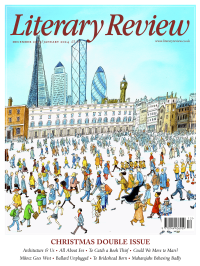Anthony Cummins
The Remains of the Lamb
Lord Jim at Home
By Dinah Brooke
Daunt Books 264pp £9.99
In the 1970s, the author Dinah Brooke, now aged eighty-eight, published four novels before leaving her life in London to join an ashram in India, never again to produce fiction. The second of those novels, Lord Jim at Home, is a grotesque coming-of-age comedy that doubles as a war story and (eventually) a crime narrative, all in the guise of a satire on upper-crust manners. Long out of print, the book has now been republished with a foreword by Ottessa Moshfegh – a hint to anyone familiar with the American author’s own morbidly yucky output that Brooke’s novel won’t be a bed of roses. Reader beware: even Moshfegh finds it startling.
Initially set in Cornwall, the novel follows the childhood and abruptly curtailed adulthood of Giles, the eldest son of a prosperous but loveless English couple. An unwanted baby, ignored as a toddler, he is terrorised by the sadistic toilet training of his Scottish nanny, who dangles him out of a window when he refuses to eat his greens. His parents offer no solace: when Giles leaves a bit of unwanted fat on his plate – duly discarded by the housekeeper – his father salvages the scraps from the bin, insisting that he polish off the lot, right down to a scavenged rind with ‘a rim of mildew round the edge [that] looks as if it had been chewed and abandoned some time ago by a dog’ (his mother promptly forks it into him). In the background hovers Giles’s incontinent grandfather, who is accidentally crushed to death by his nurse after he insists that she sleep with him.
All this and the book has barely begun. What follows is a story of damage piled upon damage until the victim turns perpetrator – an outcome hinted at in passages suggesting that what we’re reading is the case in a prosecution. Giles is packed off to boarding school aged nine, then joins the navy after the start of the Second World War, where battles are a terrifying splatterfest of flying limbs and squished organs. We see a slain crewmate’s legs ‘stuck to the deck by the drying pool of their own blood’:
Giles empties out the trouser pockets before putting the legs aside for a Christian burial. The smell of blood mixed with crap is sickening. Still, once you’ve started something you’ve got to finish it, that’s one lesson the navy teaches you.
It is characteristic of the novel’s peculiar ambiance that these episodes should strike Giles – and even the reader – as relief from his oppressive upbringing, despite the gore. The book’s energy lies not merely in the accumulation of cruelty but also in the restlessly wrong-footing narration, in which the point of view is always shifting to portray the messed-up protagonist from inside and out. Yet what never changes is the tone: Brooke’s ostensibly neutral voice can’t help but suggest tickled glee, even in the darkest scenes. Throwaway passages contribute to the atmosphere of unrelenting horror: at one point there’s a gruff mention of an ex-soldier who raped his nine-year-old stepdaughter (‘the old man was stuffing it up her … The little girl didn’t like it much’) before strangling and burying her, then eating a turnip pasty.
Comparisons have been drawn to the books of Edward St Aubyn, but where the nastiness of the Melrose series is offset by a measure of suavity, no reader could detect glamour in the world of Lord Jim at Home, which is grubby all the way through. Giles ends the novel as a drifter and thief, ready to embark on a final act the dustjacket describes as ‘so shocking that it calls … his whole world into question’. Yet by that point the book has taught us to be shocked at nothing – it is a story of horrible people doing horrible things, described in horrible clarity. As for the title, it’s a puzzle. In Joseph Conrad’s 1900 novel Lord Jim, a shipwrecked sailor saves himself rather than his drowning passengers; at the grisly climax of Lord Jim at Home, the protagonist plunges into a moral abyss that seems entirely unrelated. It’s as if Conrad had chosen to call his own book ‘Raskolnikov at Sea’.

Sign Up to our newsletter
Receive free articles, highlights from the archive, news, details of prizes, and much more.@Lit_Review
Follow Literary Review on Twitter
Twitter Feed
The son of a notorious con man, John le Carré turned deception into an art form. Does his archive unmask the author or merely prove how well he learned to disappear?
John Phipps explores.
John Phipps - Approach & Seduction
John Phipps: Approach & Seduction - John le Carré: Tradecraft; Tradecraft: Writers on John le Carré by Federico Varese (ed)
literaryreview.co.uk
Few writers have been so eagerly mythologised as Katherine Mansfield. The short, brilliant life, the doomed love affairs, the sickly genius have together blurred the woman behind the work.
Sophie Oliver looks to Mansfield's stories for answers.
Sophie Oliver - Restless Soul
Sophie Oliver: Restless Soul - Katherine Mansfield: A Hidden Life by Gerri Kimber
literaryreview.co.uk
Literary Review is seeking an editorial intern.